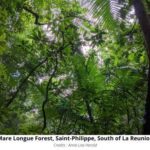
Fostering research excellence
in EU Outermost Regions


Fostering research excellence
in EU Outermost Regions

Azores
Canary Islands
La Reunion
We are glad to inform that members of the Board of the Society of Island Biology have published a major article on biodiversity loss on islands: Scientists’ warning – The outstanding biodiversity of islands is in peril in Global Ecology and Conservation. FORWARD project had the privilege of supporting Island Biology conference held in La Réunion in 2019, https://ib2019.sciencesconf.org. This conference was a keystone in the activities of the Society and publications such as the one presented here are representative of its activity.
The paper, in open-access, can be found here
A summary of the article :
Islands are key in Earth’s biodiversity as they treasure outstanding endemicity, but most of these endemic species are vulnerable. In fact around 50% of the threatened species and 75% of the known extinctions since the European expansion around the globe have happened on islands. The loss of at least 800 insular species in the past 500 years has been documented but there are many that had already gone extinct following the arrival of first human colonists on islands in prehistoric times. The authors present examples of species and insular radiation (the diversification of species on islands) and they analyse the natural vulnerability of the insular biota. This is linked to genetic and demographic factors as a result of founder events (small initial pioneer populations, thus reduced genetic diversity) as well as often small population sizes. The authors defend that the evolution toward island syndromes (trends found on island species) might have improved the ability of species to thrive under natural conditions but it has made island biota vulnerable to anthropogenic pressures such as habitat loss, overexploitation, invasive species, and climate change. The article proposes a summary of current scientific knowledge on the ongoing biodiversity loss on islands. The authors express their concern that the current tendency will be fatal to islands’ biota and they urge for action to limit island biodiversity loss.
The reference:
Fernández-Palacios, J.M., Kreft, H., Irl, S.D., Norder, S., Ah-Peng, C., Borges, P.A.V., Burns, K.C., de Nascimiento, L., Meyer, J.-Y., Montes, E. &Drake, D.R. (2021). Scientists’ warning – The outstanding biodiversity of islands is in peril. Global Ecology and Conservation, 31: e01847. DOI: 10.1016/j.gecco.2021.e01847 (IF2020 3,380; Q1 Ecology)